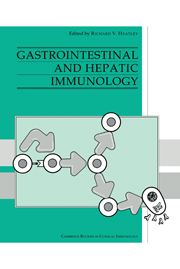Book contents
- Frontmatter
- Contents
- List of contributors
- Preface
- 1 Lymphoid cells and tissues of the gastrointestinal tract
- 2 Lymphocyte migration to the gut mucosa
- 3 Regulating factors affecting gut mucosal defence
- 4 Gastritis
- 5 The immunology of coeliac disease
- 6 Inflammatory bowel disease
- 7 Food intolerance and allergy
- 8 Gastrointestinal and liver involvement in primary immunodeficiency
- 9 Secondary immunodeficiency – the acquired immunodeficiency syndrome (AIDS)
- 10 Intestinal infections
- 11 Lymphomas
- 12 Small bowel transplantation
- 13 Clinical aspects of immunologically mediated intestinal diseases
- 14 Chronic active hepatitis
- 15 Primary biliary cirrhosis
- 16 Immunology and immunopathology of acute viral hepatitis
- 17 Immunology of liver transplantation
- 18 Clinical correlates with hepatic diseases
- Index
Preface
Published online by Cambridge University Press: 03 February 2010
- Frontmatter
- Contents
- List of contributors
- Preface
- 1 Lymphoid cells and tissues of the gastrointestinal tract
- 2 Lymphocyte migration to the gut mucosa
- 3 Regulating factors affecting gut mucosal defence
- 4 Gastritis
- 5 The immunology of coeliac disease
- 6 Inflammatory bowel disease
- 7 Food intolerance and allergy
- 8 Gastrointestinal and liver involvement in primary immunodeficiency
- 9 Secondary immunodeficiency – the acquired immunodeficiency syndrome (AIDS)
- 10 Intestinal infections
- 11 Lymphomas
- 12 Small bowel transplantation
- 13 Clinical aspects of immunologically mediated intestinal diseases
- 14 Chronic active hepatitis
- 15 Primary biliary cirrhosis
- 16 Immunology and immunopathology of acute viral hepatitis
- 17 Immunology of liver transplantation
- 18 Clinical correlates with hepatic diseases
- Index
Summary
The study of mucosal immunity has moved quickly in recent years, particularly in relation to gut and liver diseases. Our understanding of antigen handling, mucosal defences and cell traffic has increased dramatically. In parallel with this progress in basic scientific knowledge have come many significant clinical advances. Immunisation, immunosuppressive treatment and organ transplantation have over the last decade become everyday forms of treatment in hepatology. Sadly, in disorders of the gastrointestinal tract, similar progress has not been equally forthcoming. Immunosuppressive treatment has been used largely empirically in inflammatory bowel disease and intestinal transplantation remains at a developmental stage. One compensation for gastroenterologists has been the discovery of a ‘new’ disease-that of H. pylori gastritis. Developments in our understanding of the immune response to this organism are fascinating in terms of our knowledge of mucosal immunity and may one day lead to another disorder for which vaccine developments become necessary. The gut and liver are sites for apparently classical autoimmune disorders. Slowly, our understanding of these processes is increasing, and chronic hepatitis B infection must be a model envied by many immunologists.
As with any rapidly evolving field, a number of books have appeared on this topic over the years. In this volume, the aim has been to address the most recent developments in the basic scientific mechanisms and relate these, where applicable, to areas important to practising clinicians caring for patients with hepatic and gut disease.
- Type
- Chapter
- Information
- Gastrointestinal and Hepatic Immunology , pp. xiii - xivPublisher: Cambridge University PressPrint publication year: 1994

